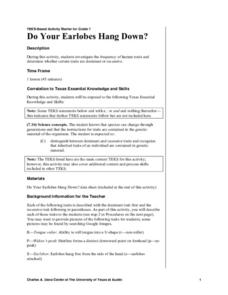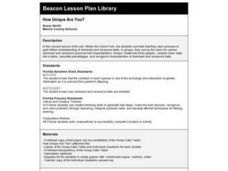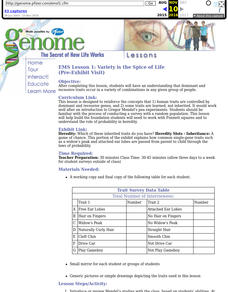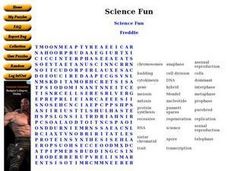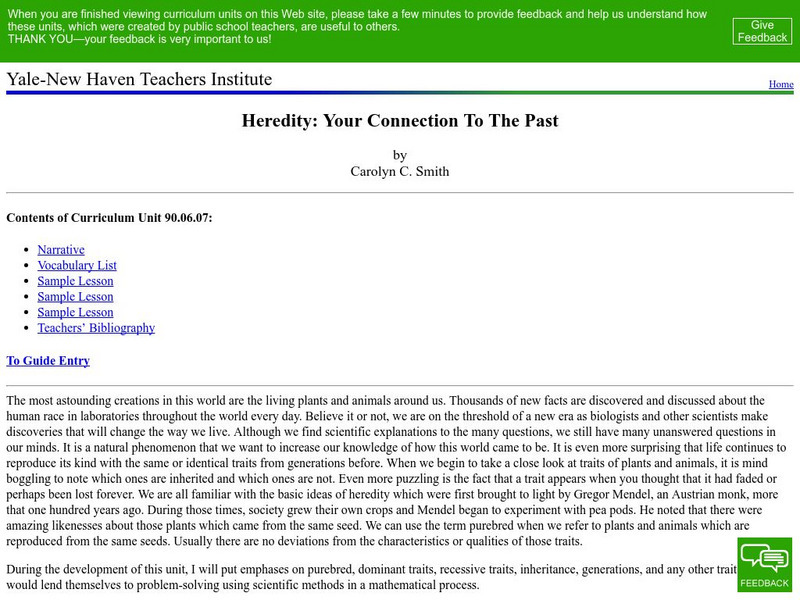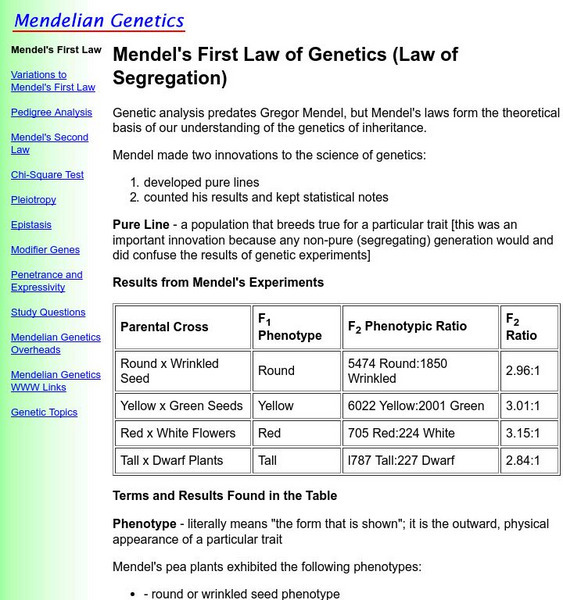Curated OER
Complete Dominance Traits
In this instructional activity, 10th graders produces a different phenotype since the dominance is incomplete. Both parents have a spotted nose. After student have determined traits, they create drawings. Students chart thier respones...
Curated OER
Variety is the Spice of Life
Students explore Gregor Mendel's work with genetics. They complete a survey of their friends and family in order to identify dominant and recessive traits. Once their surveys are complete, students discuss the ways in which dominant...
Curated OER
Do Your Earlobes Hang down?
Seventh graders listen as the teacher explains the differences between dominant and recessive traits. The data sheet is described and delivered to students. Students collect data about themselves and record it on their sheet. For the...
Curated OER
Genes, not Jeans
Fifth graders examine the difference between dominant and recessive genes, and what happens when genes are combined. They complete a worksheet on genetics after observing if they can wiggle their ears or roll their tongues. They...
Curated OER
Heredity (Mendelian Genetics)
Students observe and record observations of whether a person is a taster or nontaster. They test selected individuals from their families and peer groups and chart all findings to determine which trait (e.g. taster or non-taster) is...
Curated OER
Genetically Inherited Traits
Students explore heredity by examining how traits are passed from parent to offspring. Genetic terminology is examined and examples of inherited traits discussed. calculating genetic probability is also investigated in this lesson.
Curated OER
Fun with Heredity
Learners explore basic concepts of heredity and collaborate to see genetics in action through several activities provided in the instructional activity. Inherited traits are examined and identified as dominant or recessive.
Curated OER
How Do Organisms Vary?
Students study variation of organisms. They determine this variation arises from genetic and environmental causes.
Curated OER
How Unique Are You?
Students explore how genetic information is passed down from parent to offspring. Because of this, they examine how this causes the variation in each species.
Curated OER
Heredity: Your Connection To The Past
Young scholars investigate genetics and the process of reproduction in living organisms.
Curated OER
EMS Lesson 1: Variety is the Spice of Life
Learners discern that dominant and recessive traits occur in a variety of combinations in any given group of people.
Curated OER
Genes
In this biology worksheet, 9th graders identify and locate various vocabulary terms related to the study of genes. There are 18 biology terms located in the word search.
Curated OER
Genetic Terms
In this biology worksheet, students identify and locate various vocabulary terms related to genetics. There are 15 biology terms located in the word search.
Curated OER
Science Fun
For this biology worksheet, students identify and locate various vocabulary terms related to the cells of the body. There are 32 biology terms located in the word search.
Curated OER
A Tasteless Tasty Test
Students review the inheritance patterns of simple dominant and recessive traits in humans. They use PTC tasting as a model trait. Each student determines whether or not they are a taster using PTC paper then they compile and discuss the...
Curated OER
World-wide Search for the Dominant Trait
Students receive instruction on dominant/recessive traits, access World-Wide Search for the Dominant Trait and download information on which traits to assess. They collect data on at least 20 people and prepare a data chart.
Curated OER
Here's Looking at You
High schoolers assess some common inherited traits which are easily observable and note their phenotype for the trait. Students compare their phenotypes to those of their parents and attempt to describe the pattern and manor of inheritance.
Curated OER
Genetic Screening In The Workplace: Case Study
Students participate in a small group discussion/role play of a specific case study concerning the use of genetic screening in the workplace.
Education Development Center
Education Development Center: Mendel's Peas
There are many ways to learn about Gregor Mendel and his pea experiments. This interactive tutorial requires users to actually plant, grow, and cross different plants to observe their traits. Pedigrees are also used to help show dominant...
Science Buddies
Science Buddies: Are You Left or Right Sided?
Our brains are split into two parts, right inside our head. One half is the left brain and the other half is the right brain. Each side of your brain controls different parts of your body and most people are more dominant controlling one...
Yale University
Yale New Haven Teachers Institute: Heredity: Your Connection to the Past
An indepth introduction to genetics as a whole with sample lessons, vocabulary, and bibliography. From the Yale-New Haven Teachers Institute.
University of Hamburg
University of Hamburg: Deviations From Mendelian Laws And: What Is the Meaning of Dominance?
Upper level discussion of several of Mendel's experiments and laws.
ArtLex
Art Lex: Emphasis
A complete description of the term, "emphasis," with links to show how emphasis relates to art. Includes examples of work by Klimt, Demuth, and Minor.
Other
North Dakota State: Mendel's First Law (Law of Segregation)
This resource explains Mendel's first law (Law of Segregation) in detail. Includes Mendel's original experiments with results and conclusions.




